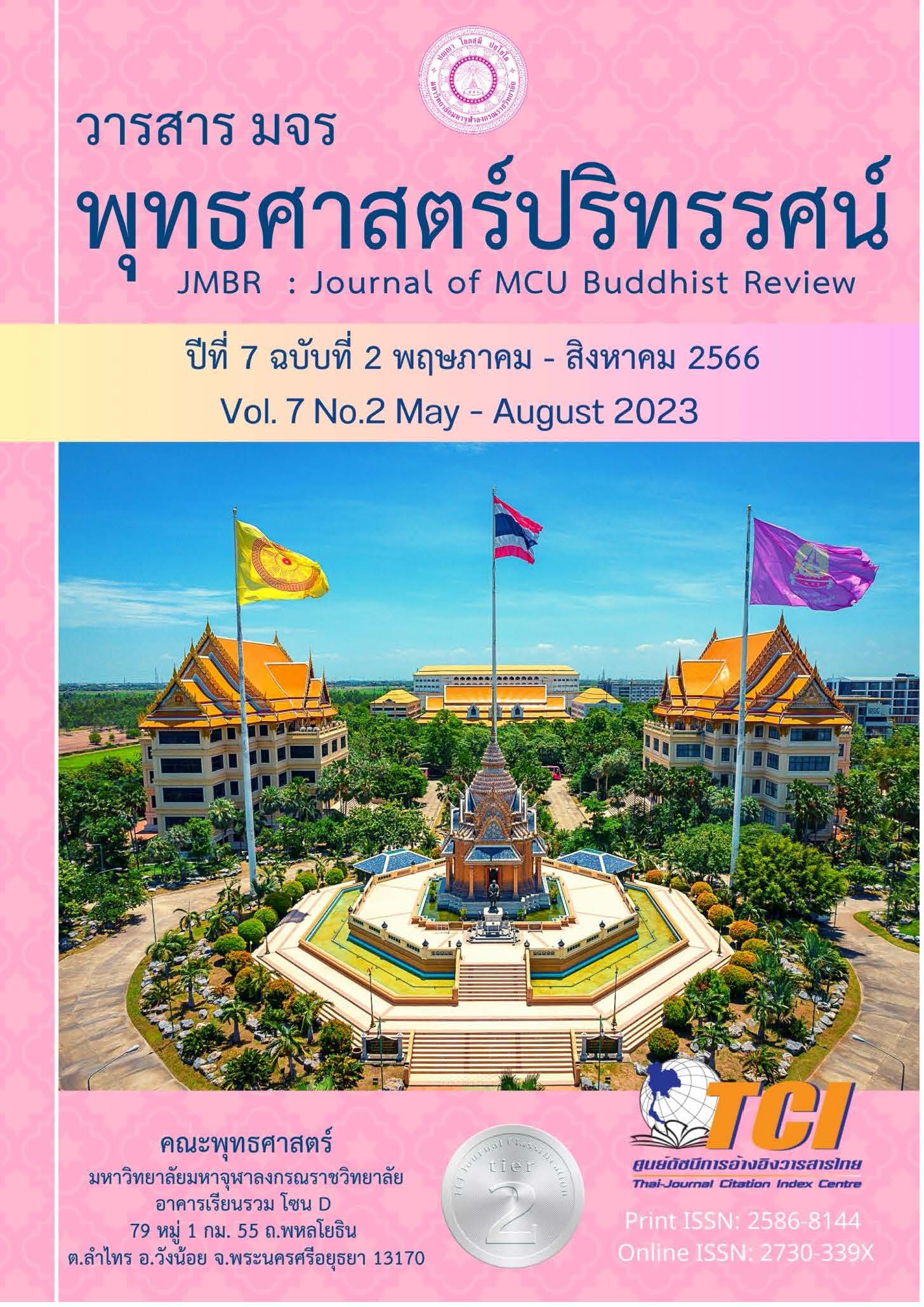แรงจูงใจกับมนุษยสัมพันธ์ในการจัดการองค์กรเชิงพุทธ
Main Article Content
บทคัดย่อ
บุคลากรจะต้องมีแรงจูงใจในการทำงานมีทัศนคติที่ดีต่อองค์กร ด้วยเหตุนี้ทุกองค์กรจึงต้องการให้บุคลากรของตนเป็นบุคลากรที่มีคุณภาพ และมีจิตสำนึกในการปฏิบัติงานในหน้าที่ของตนอย่างเต็มที่และสิ่งที่จะทำให้บุคลากรในองค์กรปฏิบัติงานด้วยความเต็มใจและทุ่มเทให้กับงานอย่างเต็มที่นั้นก็คือ แรงจูงใจในการทำงาน การสร้างแรงจูงใจนี้จึงเป็นปัจจัยที่สำคัญในการบริหารงานขององค์กรหรือหน่วยงาน จึงต้องให้ความสำคัญต่อบุคลากรในองค์กรด้วยการสร้างแรงจูงใจในด้านต่าง ๆ เพื่อจะช่วยยังประโยชน์ต่อบุคลากรที่จะปฏิบัติงานให้องค์กร เพื่อช่วยให้บุคลากรสามารถสนองต่อวัตถุประสงค์ขององค์กรและสนองความต้องการของตนเองไปพร้อม ๆ กัน ไปด้วย เพื่อให้ได้รับความยุติธรรมจากองค์กรและฝ่ายบริหารในด้านต่าง ๆ และ เพื่อให้มีขวัญกำลังใจในการปฏิบัติงาน รวมถึงจำเป็นต้องสร้างมนุษยสัมพันธ์เป็นสะพานเชื่อมความสัมพันธ์อันดีต่อกันระหว่างบุคลากรในองค์กร กระบวนการในความสัมพันธ์ของมนุษย์ที่แสดงออกมาในรูปของการจูงใจหรือสร้างความพึงพอใจตามหลักมนุษยสัมพันธ์ นั่นมีความสำคัญต่อการบริหารงานทุกขั้นตอนองค์กร แรงจูงใจกับมนุษยสัมพันธ์ในการจัดการองค์การเชิงพุทธ เป็นแนวทางในการจัดกรองค์การที่มีประโยชน์ต่อมนุษยสัมพันธ์ในองค์กรเป็นอย่างยิ่งด้วยหลักพรหมวิหาร 4 ที่ทุกคนในองค์กรต้องกระทำมีต่อกันด้วยหลักเมตตามีความปรารถนาให้ผู้อื่นมีความสุข ประสบความสำเร็จในหน้าที่การงาน กรุณามีความปรารถนาให้ผู้อื่นพ้นทุกข์ มีความตั้งใจจริงที่จะช่วยเหลือ มุทิตามีความยินดีเมื่อผู้อื่นได้ดี ประสบความสำเร็จในหน้าที่การงานและอุเบกขา มีการรู้จักวางเฉย วางตัวเป็นกลาง ไม่เข้าข้างใครให้ความยุติธรรมกับทุกคน
Article Details

อนุญาตภายใต้เงื่อนไข Creative Commons Attribution-NonCommercial-NoDerivatives 4.0 International License.
- บทความที่ได้รับการตีพิมพ์เป็นลิขสิทธิ์ของวารสาร มจร พุทธศาสตร์ปริทรรศน์
- ข้อความใดๆ ที่ปรากฎในบทความที่ได้รับการตีพิมพ์ในวารสาร ถือเป็นความรับผิดชอบของผู้เขียนบทความ และข้อคิดเห็นนั้นไม่ถือว่าเป็นทัศนะและความรับผิดชอบของกองบรรณาธิการวารสาร มจร พุทธศาสตร์ปริทรรศน์
เอกสารอ้างอิง
กฤษณา ศักดิ์ศรี. (2534). มนุษยสัมพันธ์ เล่ม 1. กรุงเทพฯ: อักษรวิทยา.
ธร สุนทรายุทธ. (2551). การบริหารจัดการเชิงปฏิรูป ทฤษฎี วิจัยและปฏิบัติทางการศึกษา. กรุงเทพฯ: เนติกุลการพิมพ์.
ธีรรัตน์ กิจจารักษ์. (2538). การบริหารการศึกษา. เพชรบูรณ์: คณะครุศาสตร์ สถาบันราชภัฏเพชรบูรณ์.
พรรณทิพย์ ศิริวรรณบุศย์. (2549). มนุษยสัมพันธ์. กรุงเทพฯ: จุฬาลงกรณ์ 2549
พระธรรมปิฎก (ป.อ.ปยุตฺโต). (2545). พจนานุกรมพุทธศาสตร์ฉบับประมวลธรรม. พิมพ์ครั้งที่ 11. กรุงเทพฯ: บริษัท สหธรรมิก จากัด.
พิมพ์ใจ โอภานุรักษ์ธรรม. (2542). มนุษยสัมพันธ์ของผู้บริหาร. กรุงเทพฯ: คณะครุศาสตร์ สถาบันราชภัฏสวนสุนันทา.
ภารดี อนันต์นาวี. (2551). หลักการ แนวคิด ทฤษฎี ทางการบริหารการศึกษา. ชลบุรี: มนตรี.
เรียม ศรีทอง. (2540). มนุษยสัมพันธ์. กรุงเทพฯ: สถาบันราชภัฏสวนดุสิต.
วิจิตร อาวะกุล (2542). เทคนิคมนุษยสัมพันธ์. กรุงเทพฯ: ไทยวัฒนาพานิช.
วิจิตร อาวะกุล. (2541). มนุษยสัมพันธ์. กรุงเทพฯ: O.S.Printing House Co.Ltd.
วิเชียร วิทยอุดม. (2549). พฤติกรรมองค์การ. กรุงเทพฯ: ธีระฟิล์มและไซเท็กซ์.
สมยศ นาวีการ. (2542). การพัฒนาองค์การและการจูงใจ. กรุงเทพฯ: ดวงกมล.
อุทัย หิรัญโต. (2543). การบริหารประยุกต์. กรุงเทพฯ: โอ.เอส.พริ้นติ้งเฮาส์.
Beach, D.S. (1965). The management of people at word. New York: The Macmillan.
Sanfords, F.H. and Sman, L.W. (1970). Psychology. 3rd ed. Beloment: Brooks Cols.
Steers, R.W. and Porter, L.W. (2015). Motivation and work behavior. 3rd ed. New York: McGraw Hill.
Jean, G. and David, E.G. (1970). Motivation and Modern Management. Massachusetts: Addison Wesley Publishers.


